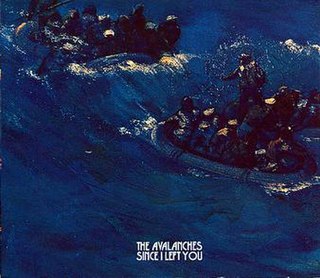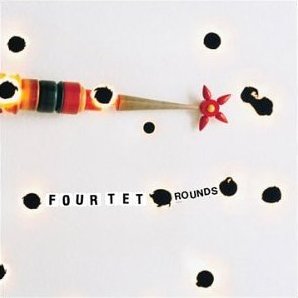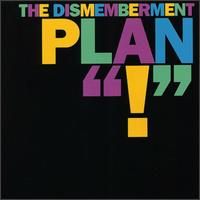
Kid A is the fourth studio album by the English rock band Radiohead, released on 2 October 2000 by Parlophone. It was recorded with their producer, Nigel Godrich, in Paris, Copenhagen, Gloucestershire and Oxfordshire.

Amnesiac is the fifth studio album by the English rock band Radiohead, released on 30 May 2001 by EMI subsidiaries Parlophone and Capitol Records. It was recorded with the producer Nigel Godrich in the same sessions as Radiohead's previous album Kid A (2000); Radiohead split the work in two as they felt it was too dense for a double album. As with Kid A, Amnesiac incorporates influences from electronic music, 20th-century classical music, jazz and krautrock. The final track, "Life in a Glasshouse", is a collaboration with the jazz trumpeter Humphrey Lyttelton and his band.

Edward John O'Brien is an English guitarist, songwriter and member of the rock band Radiohead. He releases solo music under the name EOB.

Since I Left You is the debut studio album by Australian electronic music group the Avalanches, released on 27 November 2000 by Modular Recordings. It was produced by group members Robbie Chater and Darren Seltmann, and samples extensively from various genres. The album was recorded and produced at two separate, near-identical studios by Chater and Seltmann, exchanging audio mixes of records they sampled.

Cex is an American musical project run by Rjyan Claybrook Kidwell and started in 1998 at the age of 16. Although Cex and Kidwell are frequently used interchangeably, Cex occasionally expands to several people at sporadic points, such as particular tours or albums. In the past it has included Kidwell's musical associates, friends, touring partners, or high school bandmates.

The Dismemberment Plan was a Washington, D.C. based indie rock band formed on January 1, 1993. Also known as D-Plan or The Plan, the name was derived from an industry phrase used by insurance salesman Ned Ryerson in the popular comedy Groundhog Day. The band members included Eric Axelson (bass), Jason Caddell (guitar), Joe Easley (drums), and Travis Morrison. Axelson, Caddell, Morrison and original drummer Steve Cummings formed the band in college, knowing each other from attending northern Virginia high schools. Cummings left the band after the recording of their debut album ! and was replaced by Easley, cementing the band's lineup.

Emergency & I is the third studio album by American indie rock band The Dismemberment Plan, released in 1999 by DeSoto Records. It was produced by J. Robbins and Chad Clark. At its release, the album was met with critical acclaim.

You Forgot It in People is the second studio album by Canadian indie rock band Broken Social Scene, released on October 15, 2002. It was the band's commercial breakthrough. You Forgot It in People features intricate, experimental production techniques and a large number of instruments coinciding with the band's vastly expanded size. Local excitement for the album was so big that initial pressings sold out quickly, causing the need for a 2003 reissue.

Maritime is an American indie pop band formed in 2003 after the breakup of The Promise Ring and The Dismemberment Plan.

Get Up with It is a compilation album by American jazz trumpeter, bandleader, and composer Miles Davis. Released by Columbia Records on November 22, 1974, it compiled songs Davis had recorded in sessions between 1970 and 1974, including those for the studio albums Jack Johnson (1971) and On the Corner (1972). In The Rolling Stone Album Guide (2004), J. D. Considine described the compilation's music as "worldbeat fusion".

Piracy Funds Terrorism Volume 1, usually referred to simply as Piracy Funds Terrorism, is a mixtape produced by British recording artist M.I.A. and American DJ Diplo featuring vocal tracks intended for M.I.A.'s debut album Arular mashed up with samples of other recordings. The mixtape was produced by the two artists at Diplo's home studio in Philadelphia, Pennsylvania. It was not officially released, but was distributed at M.I.A.'s live shows and via the internet to promote the release of her much-delayed debut album. Despite its unofficial status, the mixtape received general acclaim among critics. Several music publications included the mixtape in their listings of the best albums of 2004.

Rounds is the third solo album by British electronic musician Kieran Hebden, released under his alias Four Tet on 5 May 2003 by Domino Recording Company. Wanting to make a more personal record, Hebden recorded and produced the album in his North London flat over ten months using a desktop computer and a home hi-fi system. Its ten tracks feature elements of hip hop, jazz and folk; apart from a guitar part recorded for "Slow Jam", the music is composed from between 200 and 300 samples, many processed beyond recognition.

Travis Morrison is an American musician and web developer from the Northern Virginia suburbs of Washington, D.C., United States. He is best known as leader of indie-rock band The Dismemberment Plan and as a solo artist.

Travistan is Travis Morrison's solo debut album, released in 2004 by Barsuk Records. The record is named after the van that Morrison rode in during his former band The Dismemberment Plan's last tour.

! is the debut studio album by American indie rock band The Dismemberment Plan. It was released on October 3, 1995 on DeSoto Records. The band's original drummer Steve Cummings played on the album but left shortly after its release.

The Dismemberment Plan Is Terrified is the second studio album by American indie rock band The Dismemberment Plan. It was released on March 17, 1997 on DeSoto Records. Musically, the album is "less violent and less extravagant" than its predecessor, !. The album received positive reviews from critics, and got the band to sign with major record label Interscope.

This Island is the third and final album by American dance-punk band Le Tigre. It was released by Universal Records on October 19, 2004. The album was the band's only one for a major label and reached number 130 on the Billboard 200. As of 2008, the album had sold 90,000 copies.

All Y'All is Travis Morrison's second solo album, credited to the Travis Morrison Hellfighters. It was released on August 21, 2007 by Barsuk Records.

Uncanney Valley is the fifth and final studio album by American indie rock band The Dismemberment Plan. The album was released on Partisan Records on October 14, 2013, and is the band's first album since their initial break-up following the release of 2001's Change. Three singles from the album were released on streaming services prior to the album's release: "Waiting", "Invisible", and "Daddy Was a Real Good Dancer". The release of the lead single "Waiting" was teased with a promotional phone line that when dialed would play the song in low audio quality; the song would later receive a music video on October 16.

White Blood Cells is the third studio album by American rock duo the White Stripes, released on July 3, 2001. The album was recorded in less than one week at Easley-McCain Recording in Memphis, Tennessee, and was produced by frontman and guitarist Jack White. It was the band's final record released independently on Sympathy for the Record Industry. The album explores themes of love, hope, betrayal, and paranoia, which were inspired by the increased media attention the group were receiving.




















